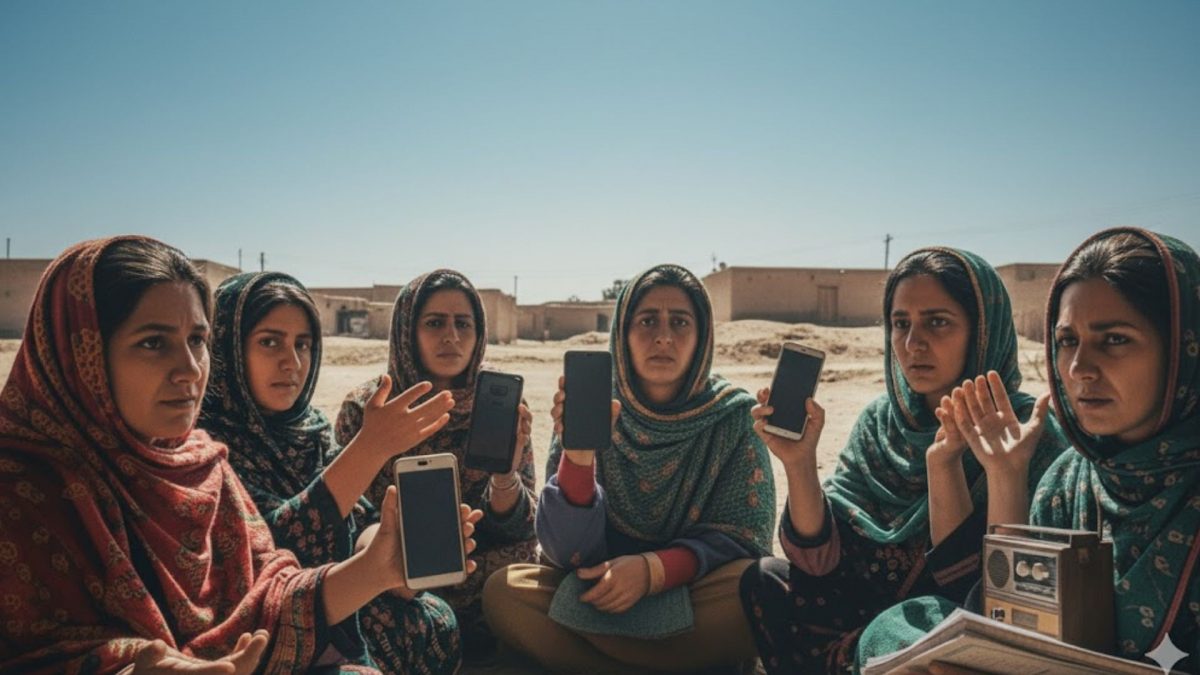“After banning schools, jobs, and every trace of public life for women, the internet was all we had and they took that too," said 27-year-old Laila Rahimi, from Kabul. Rahimi, an economics graduate from Kardan University, had been pursuing her master’s degree through an online university, hoping to find a remote work opportunity later. For her, the internet was more than a convenience. It was a lifeline.
But on 29 September, that lifeline was severed when the Taliban imposed a nationwide internet shutdown.
“Without the internet, I have no access to education,” Rahimi said. “Online learning was the only chance we had left.”
Her name—like those of all others interviewed in this story except Zahra Joya—has been changed to protect her identity.
For working women, the situation wasn’t any different.
Take Rukhshana Media—an online news outlet run entirely by Afghan women—for instance. With the internet down, the stories filed by its incognito reporters across Afghanistan couldn’t be published on the website—the very platform that keeps the organisation going.
“The majority of my journalist colleagues are still inside Afghanistan,” said Zahra Joya, founder of Rukhshana Media and recipient of several international honours, including being named one of TIME magazine’s Women of the Year in 2022 and one of the BBC’s 100 Women.
“Since we couldn’t get any news from inside the country, my colleagues and I working from outside Afghanistan did our best to keep the website running,” she told Firstpost.
Impact Shorts
More ShortsNow based in the UK, Joya continues to lead Rukhshana Media from afar. She was airlifted out of Afghanistan in 2021 during the chaotic final days of the evacuation, as the Taliban stormed back into power and foreign governments scrambled to get people out.
“It felt like we were thrown 30 years back in time without the internet,” Joya said.
For Afghan women still inside the country, it was a one-two punch. First, they were forced to work from home “until further notice”. Then, the internet vanished, taking with it their last connection to work, education, and the outside world.
“It’s heartbreaking to see what bad days have been brought upon us. We have been working from home for so long and wanted to go back to the office, but here we are now—just happy to be able to work from home, as long as they don’t cut us off from the internet,” said Shazia, a 30-year-old humanitarian.
Similarly, for 29-year-old Hadia, another humanitarian, the internet outage proved to be “nerve-racking.”
“I was out in the city when the internet and SIM services were cut, and everyone was just clueless as to what was happening. All sorts of theories and rumours made the situation worse,” said Hadia.
“Even now, when connectivity has been restored, everyone’s stressed and worried that it will happen again,” she continued.

Then there are women for whom the internet is the only way to earn a living. Think women entrepreneurs running online businesses and the many anonymous female journalists at Rukhshana Media who are also the sole breadwinners of their families. “Some on-ground reporters in northern Afghanistan used Wi-Fi from Uzbekistan near the border, and in western Afghanistan, some used the internet from Iran,” said their founder Joya.
“Only the field team had access to limited internet from the borders; nobody else on our team did,” she added.
Before the internet shutdown, some people could still use mobile data, but most found it too expensive and unreliable.
“A 100GB monthly plan of Roshan telecommunications, a telecommunications development company in Afghanistan, costs around 3,600 Afghanis (about $55),” said Hadia. That’s not something many Afghans can shell out for. In comparison, Wi-Fi services cost roughly 1,000 Afghanis a month and could be shared among a group of students.
As an alternative, some people in Afghanistan managed to send messages through Elon Musk’s Starlink satellite internet system. As the days went on, many desperate families even contemplated smuggling in more Starlink units to stay connected.
Officially, Starlink isn’t available in Afghanistan. That’s what its website says, but it’s reportedly making the rounds in the growing black market. “Internet providers have to follow the rules set by Taliban leaders. For instance, the Taliban can demand user data from providers as a condition to operate in the country,” said Joya.
As for the men, the internet shutdown was no walk in the park either.
For 28-year-old Bilal, an English tutor who teaches girls via WhatsApp, the outage was a direct hit to his livelihood. “I have over 25 students, split into different batches—and none of us could get online for class,” he said.
The irony is, the Taliban haven’t shunned the internet either. Their own youth scroll through smartphones like everyone else. On top of that, there has been no explanation from them when the internet shut off on September 29 and when it resumed after 48 hours.
Former US Ambassador to Afghanistan Zalmay Khalilzad hinted on X that the internet shutdown may not have had the support of all Taliban ministers.“
Even their own ministers are dumbfounded,” he wrote on X, before the reconnection, “I am not sure the leadership understood the consequences of its decision before taking it.”
Either way, the internet blackout did exactly what it was meant to do—instill fear.
“Hoping for this to be the first and the last time we experience such a situation in Afghanistan,” said Hadia.
But for many like Hadia, Laila, and Qudsia, the helm of internet connectivity stays at the mercy of the Taliban. It can drop anytime and show up again. But the fear of losing touch with the world will stay with them forever.
)